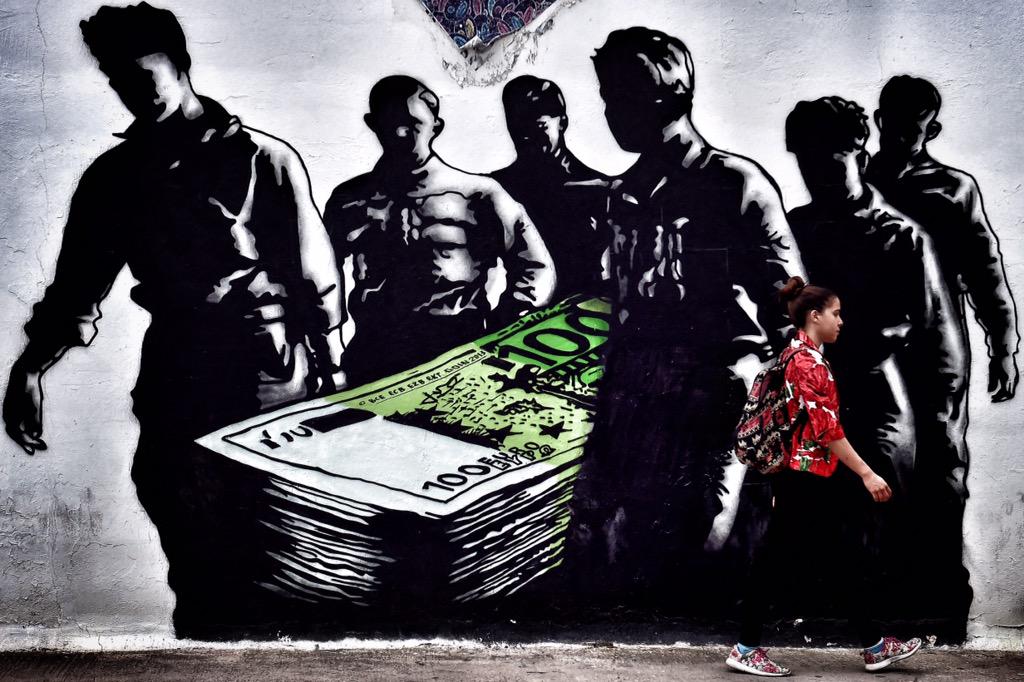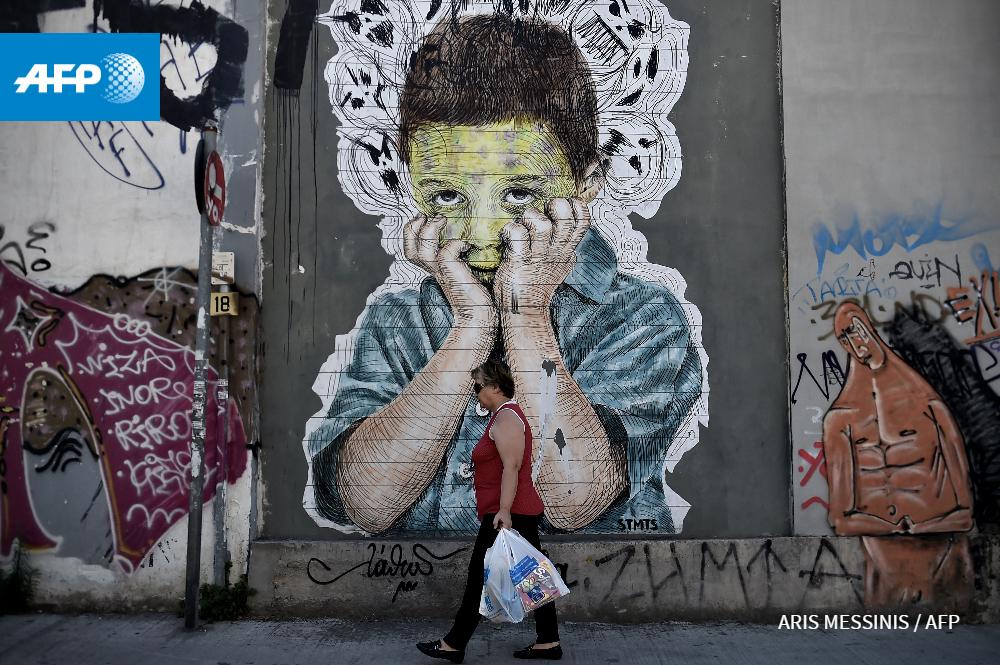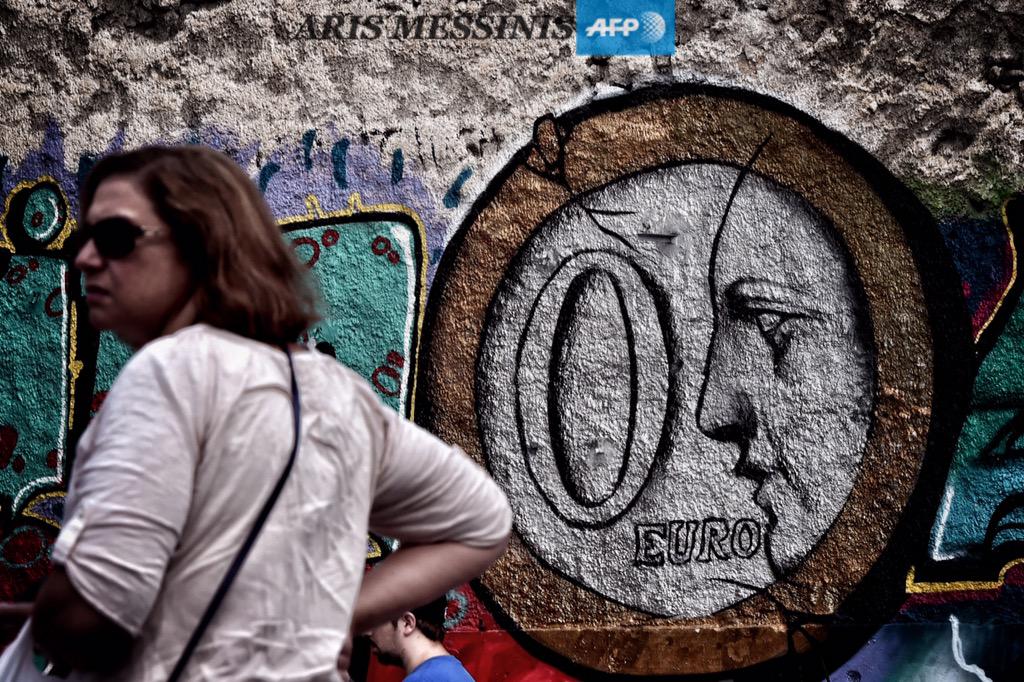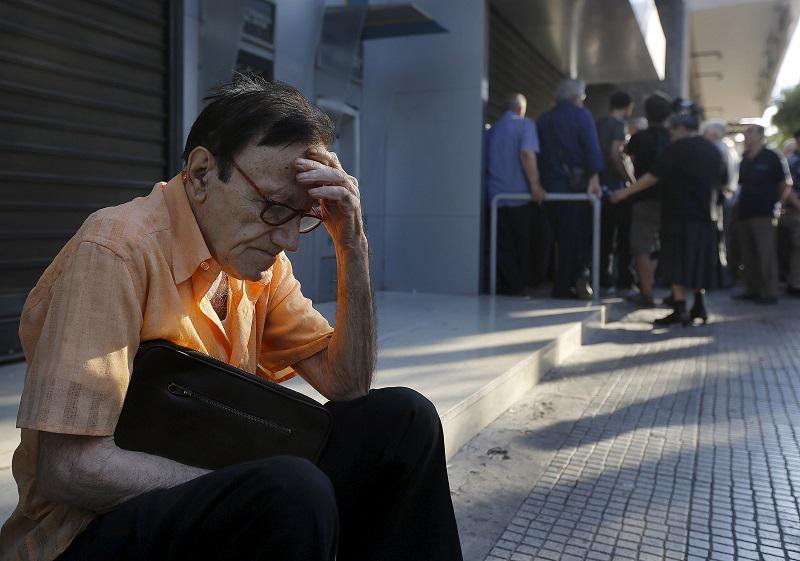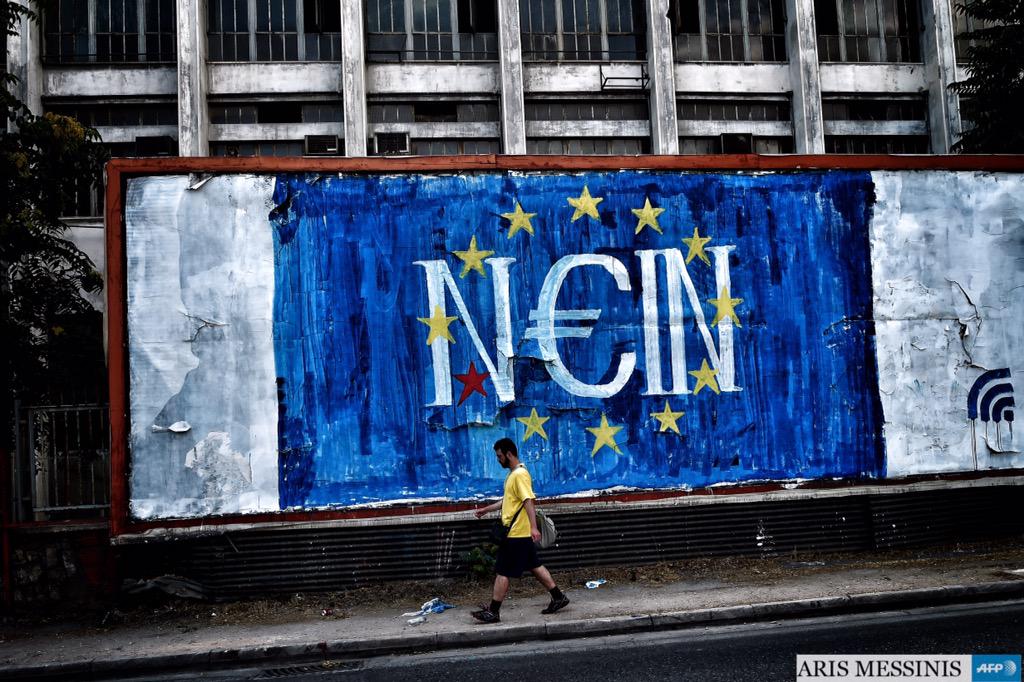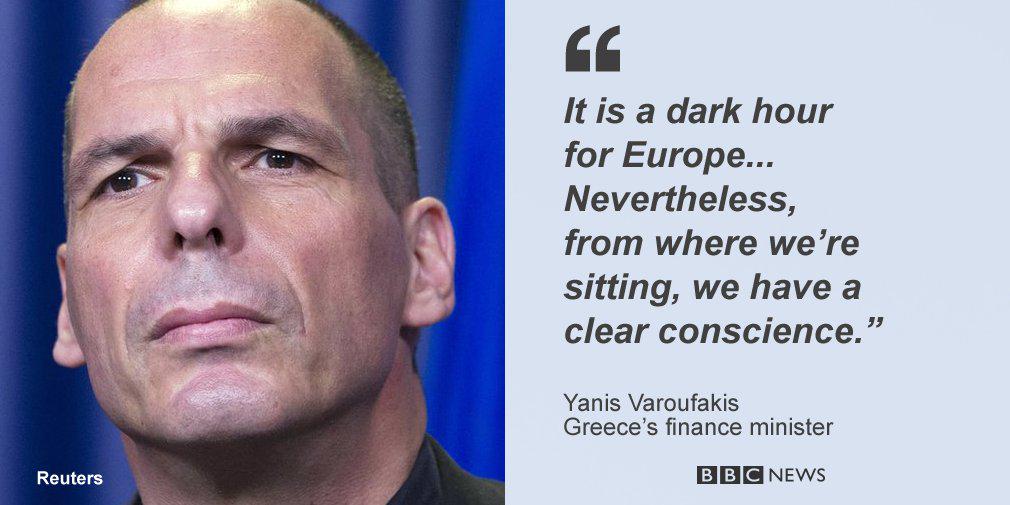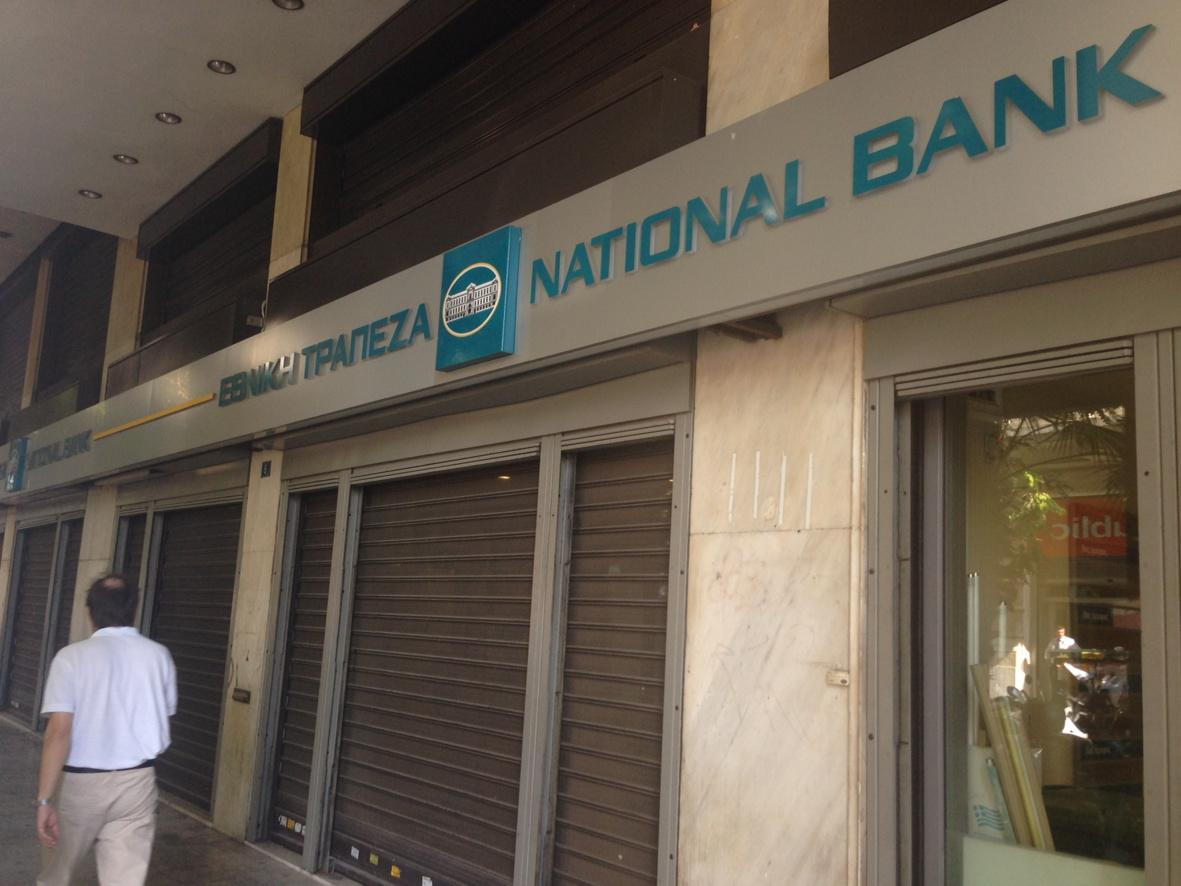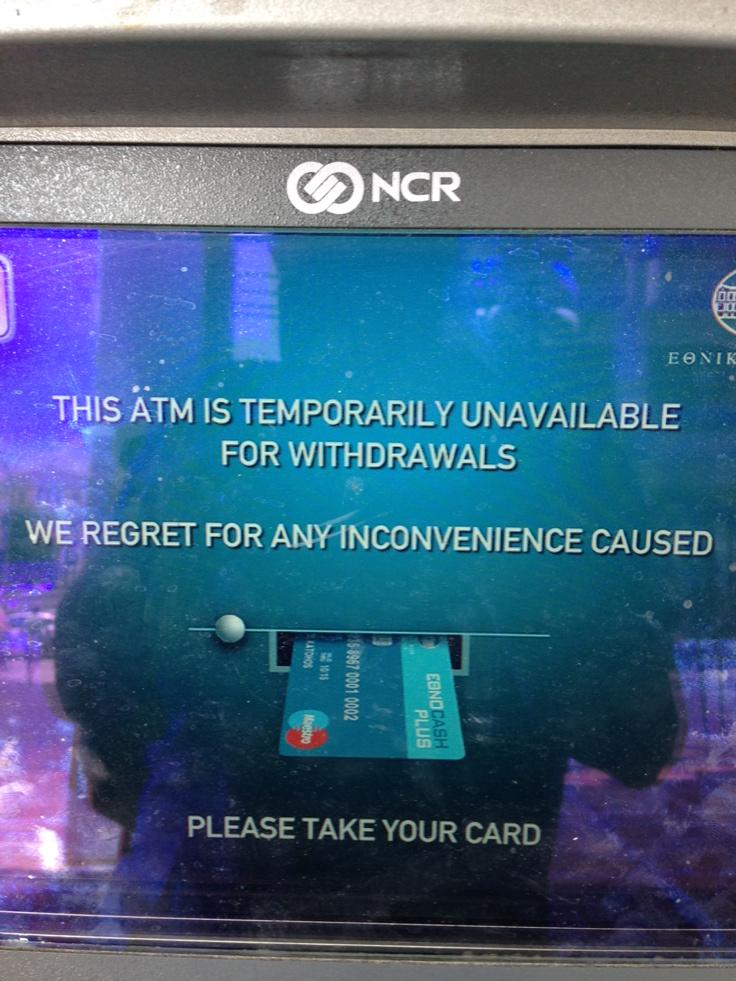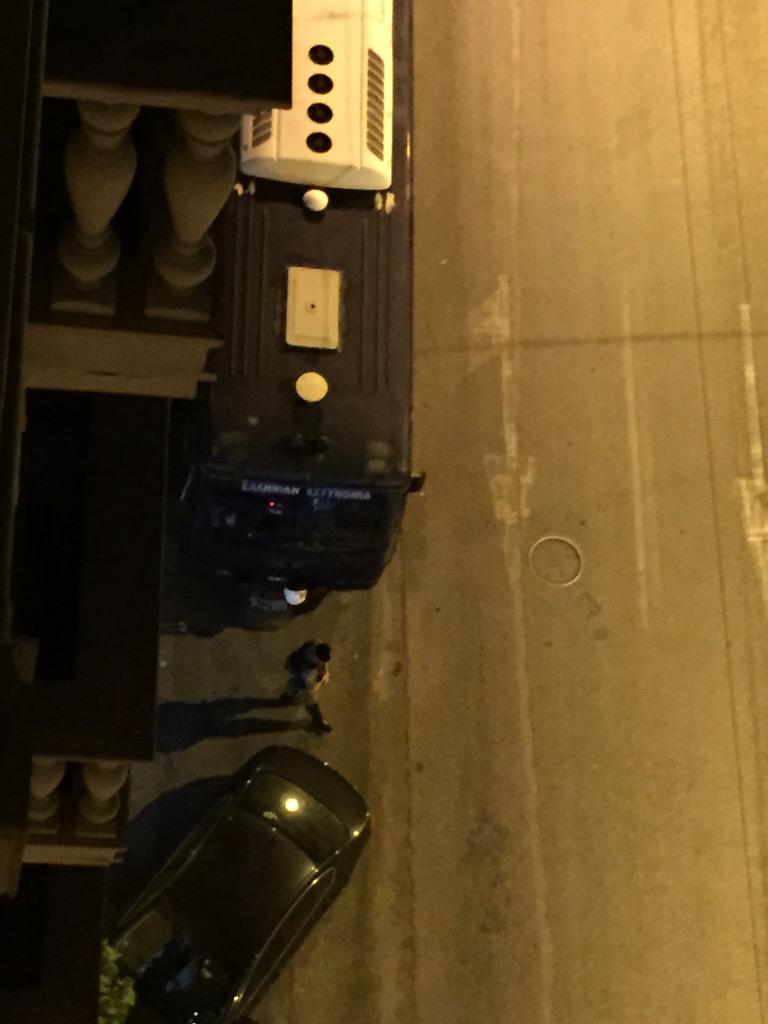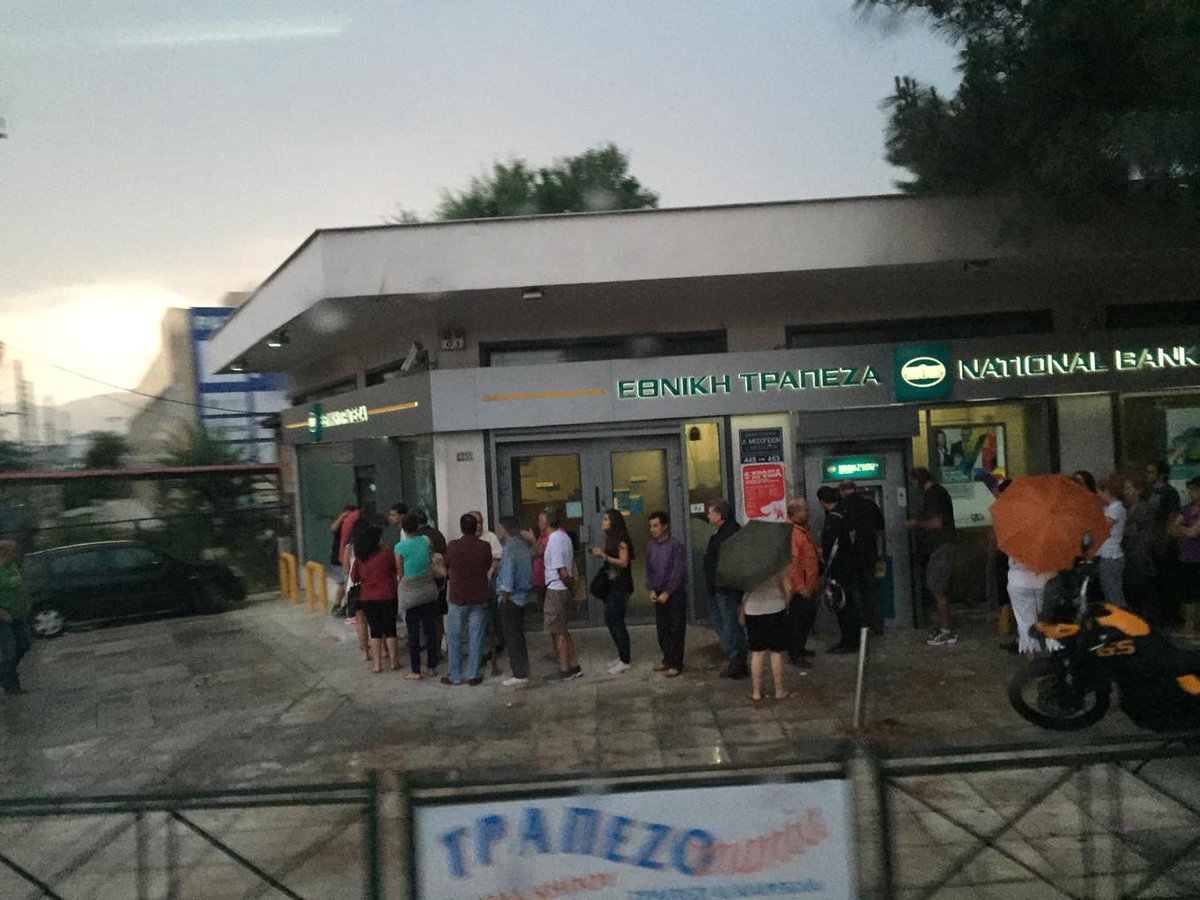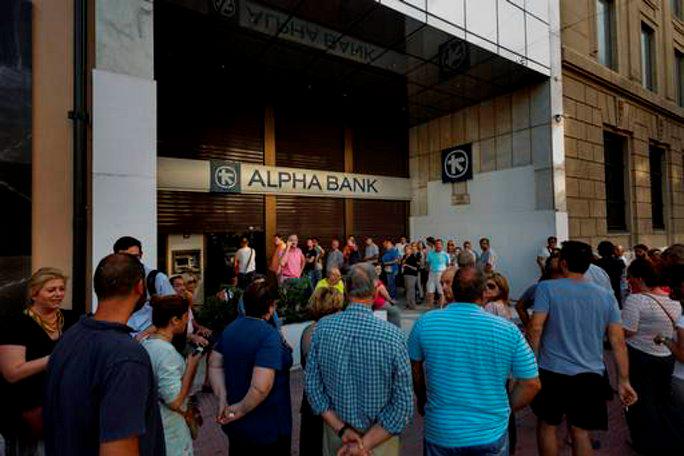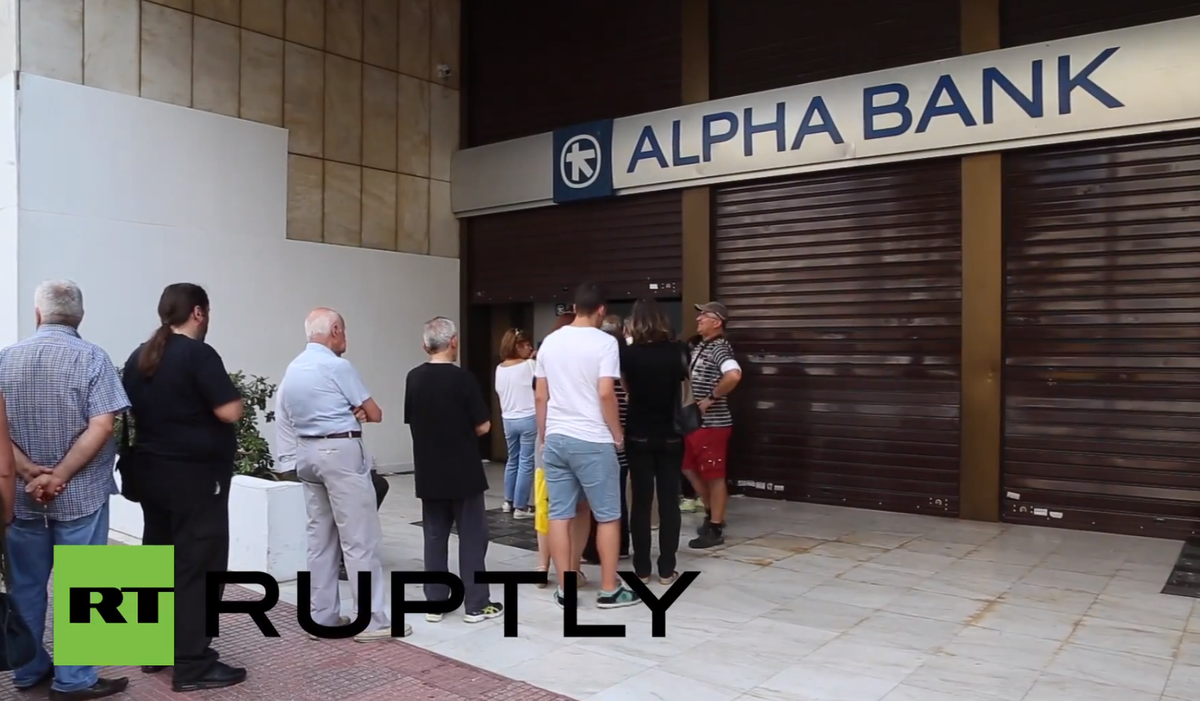.
Meanwhile in Athens: A timeless allegory. That changes by the hour: image via Nein. @NeinQuarterly, 28 June 2015
A young woman walks past a graffiti in Athens called 'Death of Euro': image via Aris Messinis @ArisMessinis, 19 June 2015
A woman walks past a wall painting in #Athens, Greece on June 24, 2015. #photo by @ArisMessinis: image via Agence France-Pressse @AFP, 24 June 2015
A woman stands in front of a graffiti bearing the number zero on a euro coin in central Athens: image via Aris Messinis @ArisMessinis, 27 June 2015
#Greece stands on the brink of bankruptcy's referendum: image via The Telegraph @Telegraph, 29 June 2015
DETAILS: Limit daily cash withdrawals 60 euros, payments and transfers abroad banned #Greece: image via RT @RT_com, 29 June 2015
![]()
#GreeceCrisis Graffiti and people in the streets in Athens on June 28, 2015. #AFP PHOTO by @ArisMessinis: image via Aurelia BAILLY @Aurelia BAILLY, 28 June 2015
Anti-EU group gathers in Syntagma Square. Sign reads: No to the agreement, overthrow the EU and the IMF #athens: image via Katie Slaman @katieslaman, 28 June 2015
![People withdraw money from ATM of Greek Alpha Bank People withdraw money from ATM of Greek Alpha Bank]()
People line up to withdraw money from an ATM outside a branch of Greece's Alpha Bank in Athens on Sunday: photo by Alexandros Vlachos / European Pressphoto Agency via Los Angeles Times, 28 June 2015
![Greece debt crisis Greece debt crisis]()
Leftist youth hold a placard reading, "No more recession, out of the Eurozone," during a demonstration in Athens calling for Greece's exit from the Eurozone: photo by Louisa Gouliamaki / AFP via Los Angeles Times, 28 June 2015
![Greek Finance Minister Yanis Varoufakis Greek Finance Minister Yanis Varoufakis]()
Greek Finance Minister Yanis Varoufakis arrives at the Finance Ministry in Athens for a meeting of the Systemic Stability Council: photo by Simela Pantzartzi / European Pressphoto Agency via Los Angeles Times, 28 June 2015
#Greece has "bent over backwards" on bailout deal but others "have not come to the party", finance minister tells BBC: image via BBC Breaking News @BBCBreaking, 28 June 2015
![]()
Graffiti around Athens as #Greece crisis escalates #photo by @atzortinis: image via Agence France-Presse @AFP, 28 June 2015
![]()
Graffiti around Athens as #Greece crisis escalates #photo by @arismessinis: image via Agence France-Presse @AFP, 28 June 2015
![]()
Graffiti around Athens as #Greece crisis escalates #photo by @arismessinis: image via Agence France-Presse @AFP, 28 June 2015
![]()
#GreeceCrisis Graffiti and people in the streets in Athens on June 28, 2015. #AFP PHOTO by @ArisMessinis: image via Aurelia BAILLY @Aurelia BAILLY, 28 June 2015
![]()
Banks in #Greece to stay closed on Monday = Sunday evening queue at the ATM ... Some anxious faces: image via jon henley @jonhenley, 28 June 2015
![]()
Banks in #Greece to stay closed on Monday = Sunday evening queue at the ATM ... Some anxious faces: image via jon henley @jonhenley, 28 June 2015
That's a shut bank ... #Greece: image via jon henley @jonhenley, 28 June 2015
A lot of these around this morning ... #Greece: image via jon henley @jonhenley, 28 June 2015
The identity of experience in the form of a life that is articulated and possesses internal continuity -- and that life was the only thing that made the narrator's stance possible -- has disintegrated. One need only note how impossible it would be for someone who participated in the war to tell stories about it the way people used to tell stories about their adventures... For telling a good story means having something special to say, and that is precisely what is prevented by the administered world, by standardization and eternal sameness.
Theodor W. Adorno: from 'The Position of the Narrator in the Contemporary Novel', in Notes to Literature: Volume One, ed. Rolf Tiedemann, 1991
#digilit15 Thomas Ernst zitiert Adorno (Standort des Erzählers): image via Philippe Wampfler @phwampfler, 26 June 2015
![Embedded image permalink]()
@NeinQuarterly Are you already in Greece? [photo by Aris Messinis/AFP]: image via Micha Hartsch @michahartsch, 28 June 2015
Is this normal for Athens? Busload of troops w/ assault rifles outside my hotel, apparently guarding govt buildings: image via Simon Shuster @shustry, 28 June 2015
A sad spectacle in Athens: image via Stathis Kalyvas @SKalyvas, 28 June 2015
Greek banks to shut for several days and limit withdrawals from cash machines: image via independent,ie @independent, ie, 28 June 2015
Some ATMs in #Athens empty after ECB retains emergency funding limit: image via Ruptly @Ruptly, 28 June 2015
Cut the debt #IMF go home graffiti in #Athens: image via Lizzie Phelan @LizziePhelan, 28 June 2015
![]()
Greek media showing pictures of long lines at ATMs. People in coats and scarves. It was 30° in Athens. SHAME ON YOU.: image via Alex Andreou @sturdyAlex, 28 June 2015
![]()
Georgios Karvouniaris and his sister Barbara outside their donated caravan, without which they would be homeless: photo by Jon Henley for The Guardian, 28 June 2015
![]()
Georgios Karvouniaris and his sister Barbara outside their caravan: photo by Jon Henley for The Guardian, 28 June 2015
![]()
#GreeceCrisis Graffiti and people in the streets in Athens on June 28, 2015. #AFP PHOTO by @ArisMessinis: image via Aurelia BAILLY @Aurelia BAILLY, 28 June 2015
Meanwhile in Athens: A timeless allegory. That changes by the hour: image via Nein. @NeinQuarterly, 28 June 2015
The spider sees bliss
Approaching in the eye
Approaching in the eye
Of an immobile fly.
Vassilis Zambaras: Web from Vazambam, Sunday 28 June 2015
Vassilis Zambaras: Web from Vazambam, Sunday 28 June 2015
A young woman walks past a graffiti in Athens called 'Death of Euro': image via Aris Messinis @ArisMessinis, 19 June 2015
A woman walks past a wall painting in #Athens, Greece on June 24, 2015. #photo by @ArisMessinis: image via Agence France-Pressse @AFP, 24 June 2015
A woman stands in front of a graffiti bearing the number zero on a euro coin in central Athens: image via Aris Messinis @ArisMessinis, 27 June 2015
#Greece stands on the brink of bankruptcy's referendum: image via The Telegraph @Telegraph, 29 June 2015
DETAILS: Limit daily cash withdrawals 60 euros, payments and transfers abroad banned #Greece: image via RT @RT_com, 29 June 2015
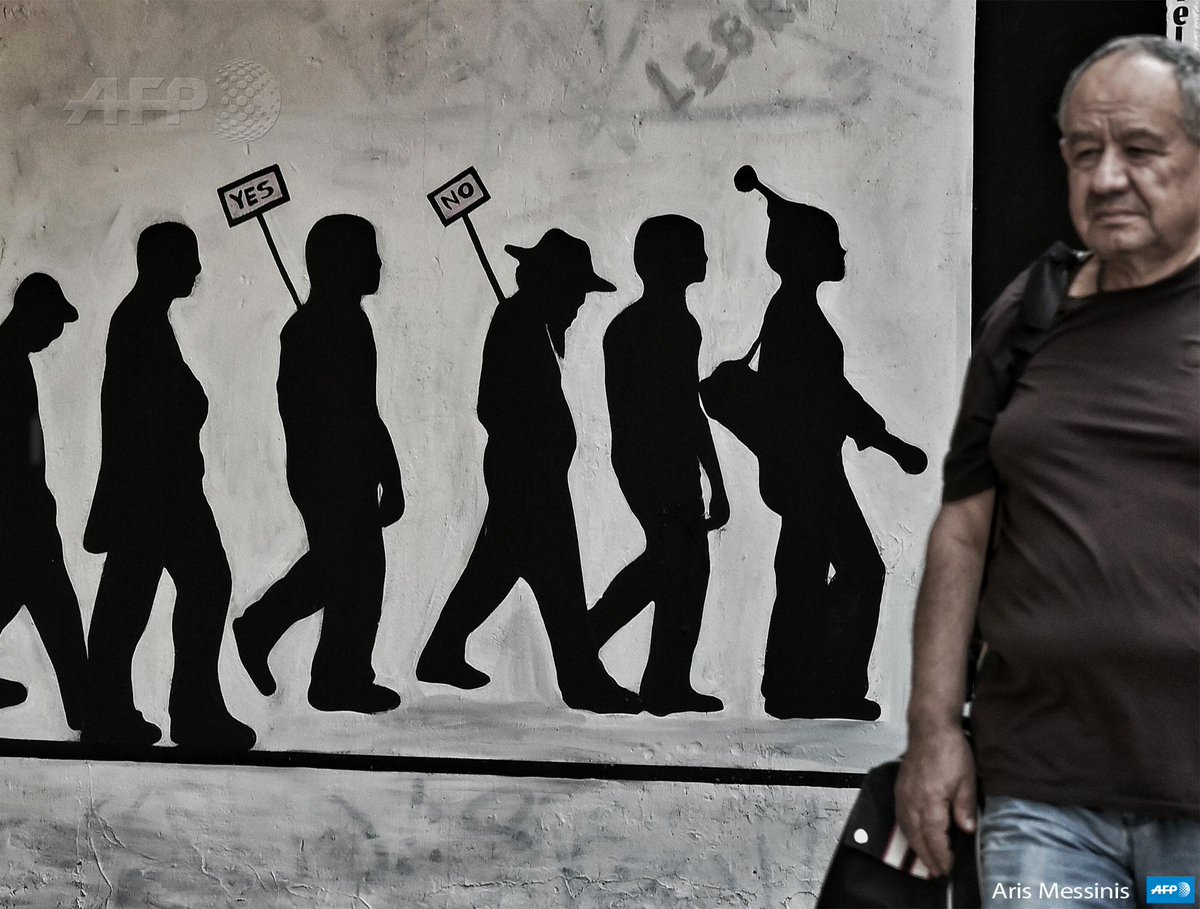
#GreeceCrisis Graffiti and people in the streets in Athens on June 28, 2015. #AFP PHOTO by @ArisMessinis: image via Aurelia BAILLY @Aurelia BAILLY, 28 June 2015
Anti-EU group gathers in Syntagma Square. Sign reads: No to the agreement, overthrow the EU and the IMF #athens: image via Katie Slaman @katieslaman, 28 June 2015
A man walks past a graffiti in Athens with a EU flag reading in German "NO" concerning Greece's referendum: image via Aris Messinis @ArisMessinis, 28 June 2015
People line up to withdraw money from an ATM outside a branch of Greece's Alpha Bank in Athens on Sunday: photo by Alexandros Vlachos / European Pressphoto Agency via Los Angeles Times, 28 June 2015
Leftist youth hold a placard reading, "No more recession, out of the Eurozone," during a demonstration in Athens calling for Greece's exit from the Eurozone: photo by Louisa Gouliamaki / AFP via Los Angeles Times, 28 June 2015
Greek Finance Minister Yanis Varoufakis arrives at the Finance Ministry in Athens for a meeting of the Systemic Stability Council: photo by Simela Pantzartzi / European Pressphoto Agency via Los Angeles Times, 28 June 2015
#Greece has "bent over backwards" on bailout deal but others "have not come to the party", finance minister tells BBC: image via BBC Breaking News @BBCBreaking, 28 June 2015
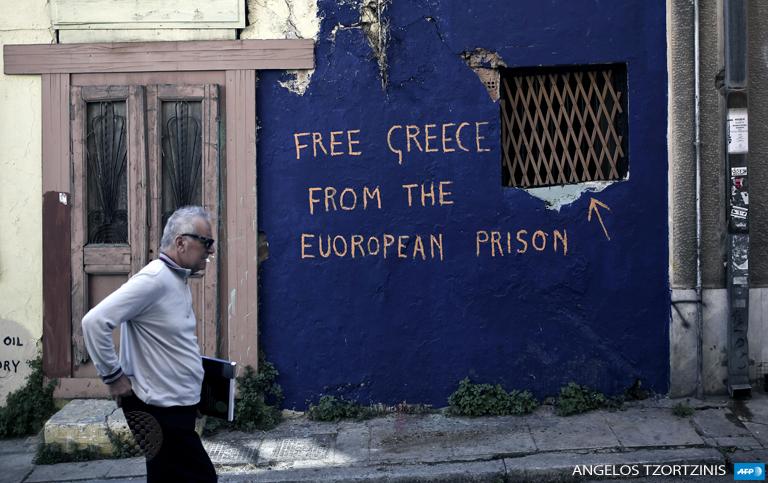
Graffiti around Athens as #Greece crisis escalates #photo by @atzortinis: image via Agence France-Presse @AFP, 28 June 2015
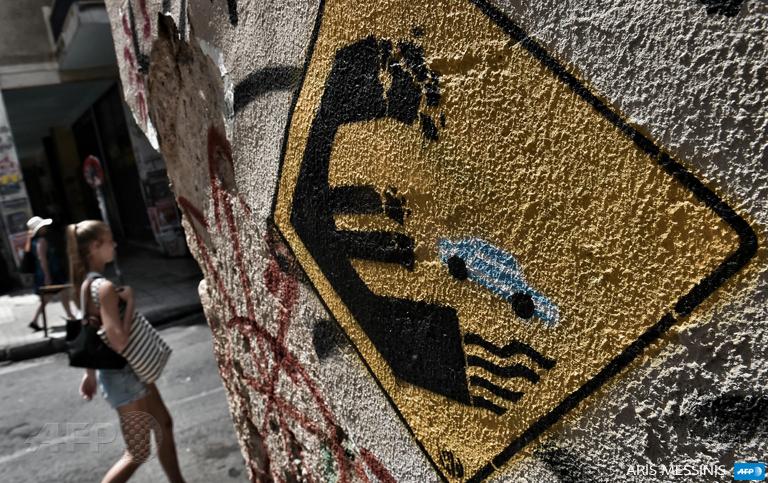
Graffiti around Athens as #Greece crisis escalates #photo by @arismessinis: image via Agence France-Presse @AFP, 28 June 2015
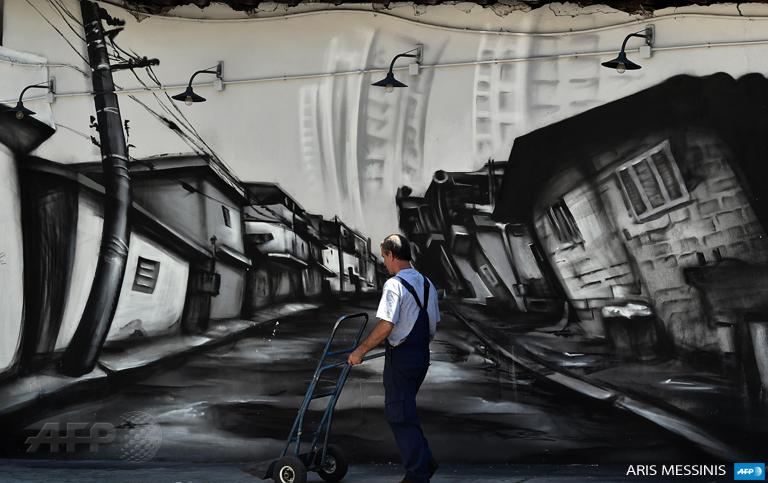
Graffiti around Athens as #Greece crisis escalates #photo by @arismessinis: image via Agence France-Presse @AFP, 28 June 2015
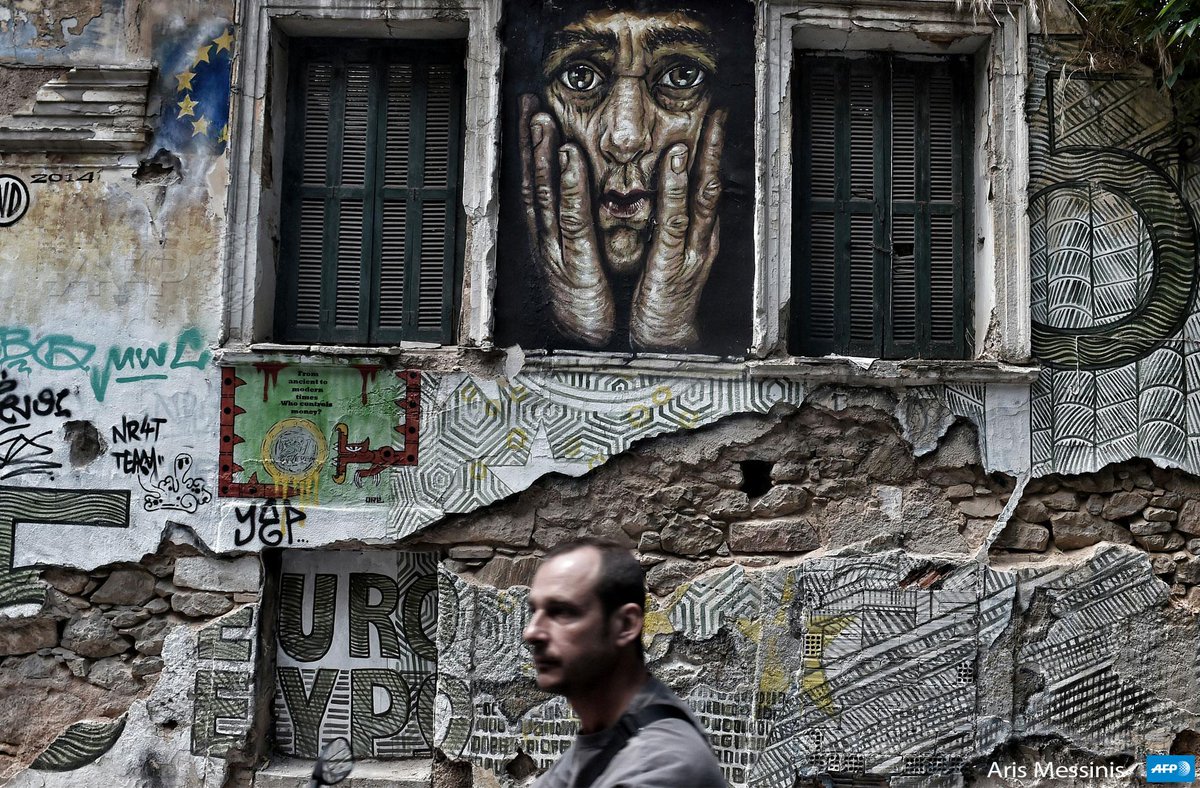
#GreeceCrisis Graffiti and people in the streets in Athens on June 28, 2015. #AFP PHOTO by @ArisMessinis: image via Aurelia BAILLY @Aurelia BAILLY, 28 June 2015
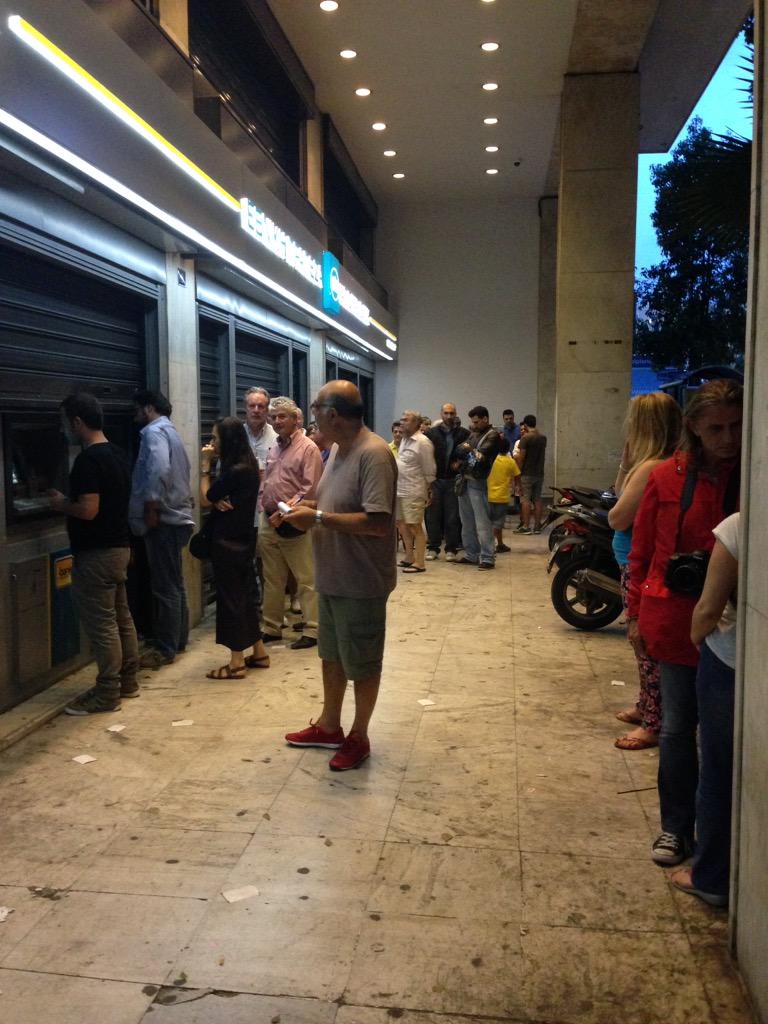
Banks in #Greece to stay closed on Monday = Sunday evening queue at the ATM ... Some anxious faces: image via jon henley @jonhenley, 28 June 2015
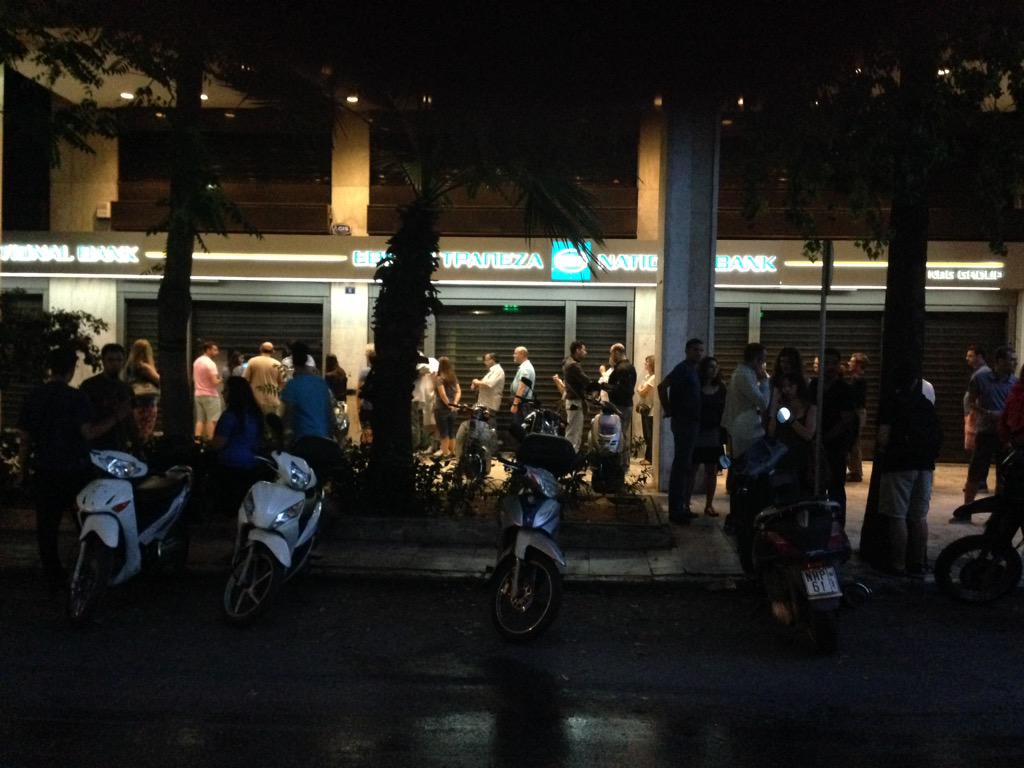
Banks in #Greece to stay closed on Monday = Sunday evening queue at the ATM ... Some anxious faces: image via jon henley @jonhenley, 28 June 2015
That's a shut bank ... #Greece: image via jon henley @jonhenley, 28 June 2015
A lot of these around this morning ... #Greece: image via jon henley @jonhenley, 28 June 2015
Theodor W. Adorno: from 'The Position of the Narrator in the Contemporary Novel', in Notes to Literature: Volume One, ed. Rolf Tiedemann, 1991
#digilit15 Thomas Ernst zitiert Adorno (Standort des Erzählers): image via Philippe Wampfler @phwampfler, 26 June 2015
@NeinQuarterly Are you already in Greece? [photo by Aris Messinis / AFP]: image via Micha Hartsch @michahartsch, 28 June 2015

@NeinQuarterly Are you already in Greece? [photo by Aris Messinis/AFP]: image via Micha Hartsch @michahartsch, 28 June 2015
Is this normal for Athens? Busload of troops w/ assault rifles outside my hotel, apparently guarding govt buildings: image via Simon Shuster @shustry, 28 June 2015
A sad spectacle in Athens: image via Stathis Kalyvas @SKalyvas, 28 June 2015
Greek banks to shut for several days and limit withdrawals from cash machines: image via independent,ie @independent, ie, 28 June 2015
Some ATMs in #Athens empty after ECB retains emergency funding limit: image via Ruptly @Ruptly, 28 June 2015
Cut the debt #IMF go home graffiti in #Athens: image via Lizzie Phelan @LizziePhelan, 28 June 2015
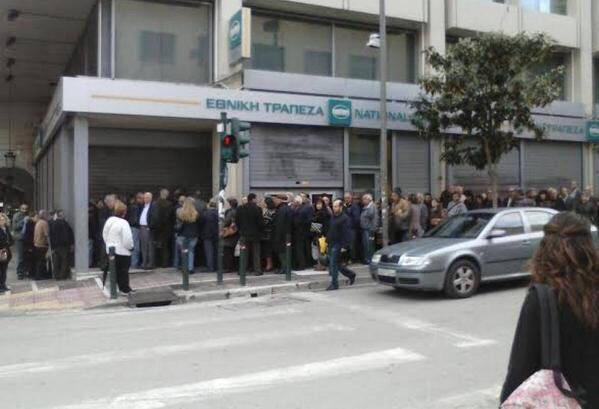
Greek media showing pictures of long lines at ATMs. People in coats and scarves. It was 30° in Athens. SHAME ON YOU.: image via Alex Andreou @sturdyAlex, 28 June 2015

Georgios Karvouniaris and his sister Barbara outside their donated caravan, without which they would be homeless: photo by Jon Henley for The Guardian, 28 June 2015
The Greeks for whom all the talk means nothing –- because they have nothing: For Georgios Karvouniaris, his sister Barbara, and many thousands like them, whether Greece stays in the eurozone or not is unlikely to have any effect: Jon Henley in Athens for The Guardian, 28 June 2015 (updated 29 June 2015)
On a steep, gardenia-scented street in the north-eastern Athens suburb of Gerakas, in one corner of a patch of bare ground, stands a small caravan.
Plastic mesh fencing –- orange, of the kind builders use –- encloses a neat garden in which peppers, courgettes, lettuces and beans grow in well-tended raised beds. Flowers, too.
The caravan is old, but spotless. It is home to Georgios Karvouniaris, 61, and his sister Barbara, 64, two Greeks for whom all the Brussels wrangling over VAT rates, corporation tax and pension reforms has meant nothing -- because they have nothing, no income of any kind.
Next Sunday’s referendum -- which, if the country stays solvent that long, will either send Greece back to the negotiating table with its creditors or precipitate its exit from the eurozone -- is unlikely to affect them much either.
“I do not see how any of it will change our lives. I have no hope, anyway,” said Georgios, sitting in a scavenged plastic garden chair beneath a parasol liberated from a skip.
After seven years of a crisis that has left 26% of Greece’s workforce unemployed, 30% of its people below the poverty line, 17% unable to meet their daily food needs and 3.1 million without health insurance, it is hard to see how anything decided in Brussels or in Athens in the coming week will do much to change the lives of a large number of Greeks any time soon.
“Those that were already on the margins have been pushed right to the very, very edge, and those who were in the middle have been pushed to the margins,” said Ioanna Pertsinidou of Praksis, a charity that runs day centres for vulnerable people and offers legal and employment advice.
“So many people – ordinary, low-to-middle income people with jobs and homes and their lives on track -- have seen their lives go drown the drain so fast,” Pertsinidou said. “People who never dreamed that one day they would not be able to pay their electricity bill, or feed their children properly.”
As it has scrabbled for every last cent to satisfy its creditors and ward off bankruptcy, Greece’s government has taken cash wherever it could -- local authorities, healthcare, pensions, social services have all been tapped. In a country of 11 million people, public spending is now €65bn (£45.6bn) less than it was in 2010. “There is no safety net left,” said Pertsinidou.
No one need tell that to the Karvouniaris family. Georgios is a stern man, still strong, smartly shaven and dressed in a clean green polo short and jeans. His sister, remarkably jovial, wears black for their younger brother Vangelis, who died of nobody will say exactly what two years ago next month, aged 52. He spent a brief week in hospital before his death, for which his siblings recently received a €2,000 bill -- which they managed to get written off.
Until March 2013, the three lived in an apartment a mile or so away that they had shared since 1980. None of them had ever married. It worked well. Georgios, a welder and mechanic before becoming a bank security guard, and Vangelis, a salesman, shoe repairer and, latterly, gardener, were the breadwinners. Barbara cooked, cleaned and looked after her brothers.
Quite early in Greece’s crisis, Vangelis lost his job. Then in February 2011, Georgios lost his at the Agrotiki bank, where he had worked for 12 years. After leaving school at 12 and working ever since, Georgios got €465 unemployment benefit for eight months, then €200 for a year, then nothing.
The rent on the apartment was €250. “We spent all we had,” he said. “Our savings. We sold Barbara’s jewellery, for half its worth. We tried to sell this patch of land but no one would buy it. For the first time in 30 years, we didn’t pay our rent. By the end we couldn’t even afford food.”
If the Karvouniarises are not now sleeping rough, it is because a neighbour saw them sitting in tears outside their apartment building, formally threatened with eviction and all packed up but with nowhere to go. They had not eaten for three days.
It took time, but Despina Moragianis -- a relative of that neighbour -- and her friends, Ann Papastavrou and Niki Festas, women in their 60s, rallied their women’s group in Halandri.
Twenty-odd people, none wealthy, pitched in to buy the 15-year-old caravan, which was towed to the Kourvaniaris family’s small plot, once intended as Barbara’s dowry.
For 13 months there was no water, but a campaign by the women persuaded the Gerakas town hall to fit a standpipe in May last year. Later, the group raised €1,000 to have it plumbed into the caravan and a septic tank dug, so the toilet works. The next target is a solar panel for electricity.

Georgios Karvouniaris and his sister Barbara outside their caravan: photo by Jon Henley for The Guardian, 28 June 2015
Every month the group holds a raffle, the proceeds of which buy fresh fruit and vegetables -- apples, oranges, beans, potatoes -- which Moragianis and her friends bring up to the caravan once a week. Fresh meat is once a week. Non-perishables -- spaghetti, rice, flour, condensed milk, tomato sauce -- come from the food bank.
And so the Karvouniaris siblings survive. Georgios digs, recycles what he can find on the streets, takes long walks and dreams of fresh milk. No electricity means no fridge. Barbara cooks – there is a gas stove – cleans, washes clothes and tends her garden.
The couple have no money -- a friendly town hall official paid their latest €18 water bill out of his own pocket -- and no hope of any until Georgios qualifies for his pension at 67. “I’d hoped it might be 65, in four years’ time, but they’ve just recently decided to raise the age limit,” he said.
He is not sure how much he will get even then. Pensions have been a major stumbling block in Greece’s aid-for-reforms talks with its creditors, who want further savings from a system whose benefits have already been cut by 45%, leaving nearly half of Greece’s pensioners below the monthly poverty threshold of €665.
It is not just pensioners in penury. Under a limited relief programme promised by the Syriza party during its election victory in January, more than 300,000 of the poorest Greek households applied last month for food aid, a small rent allowance and to have their electricity reconnected for free.
So far the government has found the money to pay a small housing benefit to precisely 1,073 people, the social solidarity minister, Theano Fotiou, admitted. The €70 a month grocery voucher Georgios and Barbara were promised under the scheme -- “We have no house and no power, so there was nothing else we qualified for,” said Georgios -- has yet to materialise.
Barbara’s face briefly clouds. How does she feel about the way they have been treated? “Disgusted,” she said, quietly. “Just … disgusted.” She smiles again. “But we’ve been lucky. There are people who have nowhere to sleep at all.”
According to a University of Crete study earlier this year, there are now 17,700 people without proper and secure housing in Athens alone. Some sleep rough or in cars, others camp with friends or relatives, or live in squats and hostels.
A majority are in their own homes, threatened with imminent eviction because they are among the estimated 320,000 Greek families who have fallen behind with a mortgage or other payment to their bank.
Two are in a small donated caravan, living on food donated by a group of Greek women. Georgios is grateful, but he also gets angry sometimes. “I have worked all my life. I’ve paid my taxes all my life,” he said.
“I’m 61 years old and if it wasn’t for the generosity of people who three years ago we had never met, we would be sleeping on a bench. You do what you can. But it doesn’t seem right.”
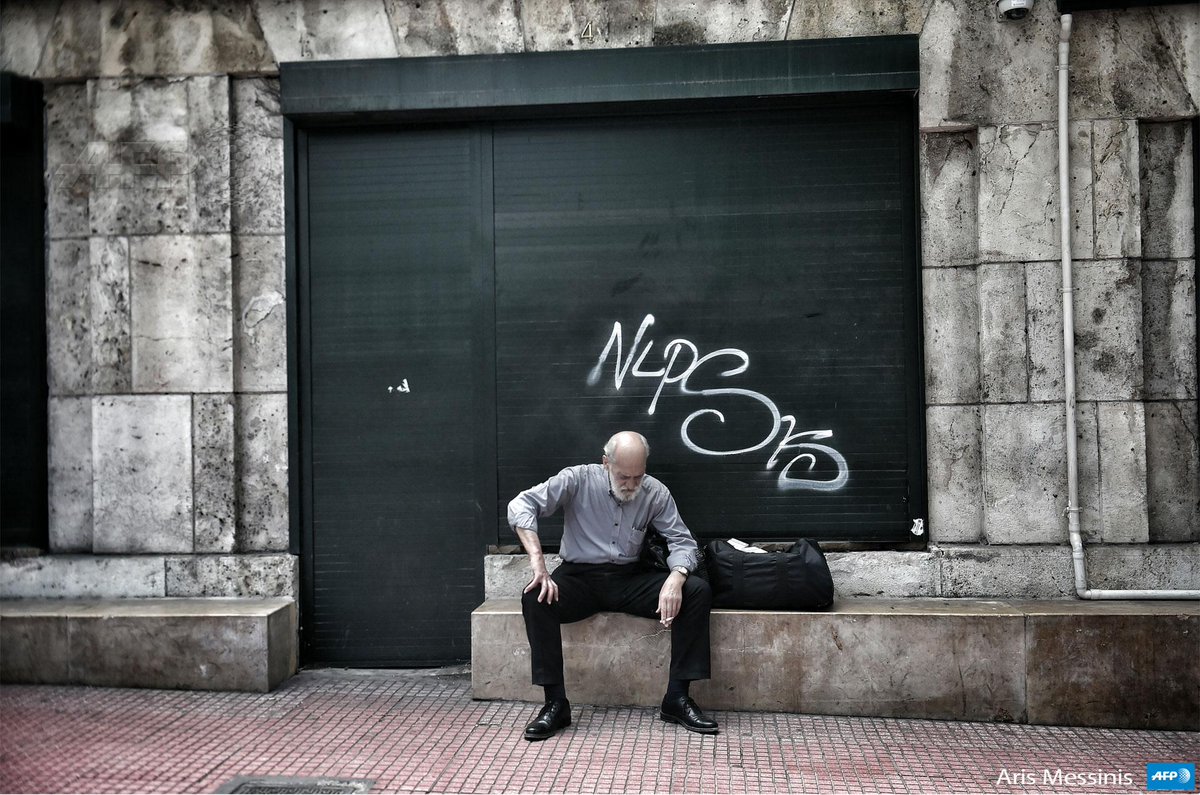
#GreeceCrisis Graffiti and people in the streets in Athens on June 28, 2015. #AFP PHOTO by @ArisMessinis: image via Aurelia BAILLY @Aurelia BAILLY, 28 June 2015

